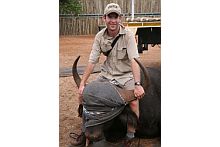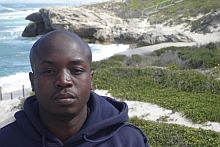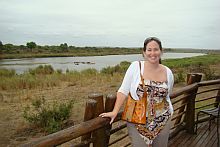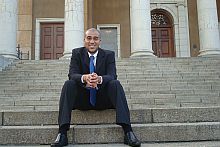Introducing the GSN's new leaders
|
Towards the end of last year, members of SAEON's Graduate Student Network (GSN) voted for their top four candidates to serve on the GSN Coordinating Committee.
And the new committee members for 2009-2010 are ... Batandwa Alperstein, Shannon Hampton, Trevor McIntyre and Brian Mubiwa. The newcomers will join existing committee members, Angela Mead and Lukhanyiso Vumazonke to take the GSN forward into the new year.
Batandwa Alperstein
Batandwa believes that the current way in which human beings organise themselves places immense pressure on our planet's ecosystems. He squarely puts the blame for the disappearance of millions of unique species on Homo sapiens.
"In order to combat this destruction, groups of young leaders will need to rise to the challenge of informing the public and private sectors on more appropriate behaviours. In the world of academia, SAEON GSN provides the ideal platform for this," he says. "However, if we are to be successful in this endeavour we will necessarily need to take a dynamic, multidisciplinary approach - economists and businesspeople listen to the language of economics and therefore need to be spoken to in their own 'tongue'."
Batandwa believes that the economic system is mostly to blame for the current state of affairs. The individuals in this system are given individual roles that free them from the blatant cruel actions of their corporations; even if they care deeply for the planet - the system renders them powerless.
"I am trained in the economic social sciences as well as being well read in the art of entrepreneurship," he says, and argues that entrepreneurship is all about systems design and is a force that creates social institutions. "Social institutions are at the heart of society. Although it is an industry that has geared itself towards profit-making, I believe that through interacting with the ecologists, botanists and oceanographers, the economists and entrepreneurial actors will begin to realise that preserving species diversity is the greatest 'profit' given to mankind."
"It is my hope that by being elected to this committee I can begin to play a part in bringing these relationships into being and thereby support the mandate of the SAEON GSN mission," says Batandwa.
Brian Mubiwa
Although the focus of Brian's PhD studies is on Urban Development, Transport and Energy, he is very much involved in collaborative research on vegetation change, using GIS and Remote Sensing, with academics from Universities of Fort Hare and Johannesburg, among various other research projects.
Brian has participated in numerous ecological and social research projects with fellow academics at Fort Hare and has presented several academic papers at national conferences and workshops. From his Honours project, one of his papers, entitled "Expanding the Frontiers of Spatial Competence: the use of Multi-dataset Digital Atlases in South African Secondary Schools in Landscape Studies" won the award for the Best Paper at the Society of South African Geographers (SSAG) Annual Students' Conference in 2005.
Apart from being a member of the SAEON GSN, Brian is also a member of the SSAG. Various leadership positions at university level (in soccer and in the Student Representative Council) and also at provincial level have been an invaluable platform for Brian to hone his leadership and coordinating skills.
Brian describes himself as a fun-loving person who believes that the mixture of "good craziness" and "academic seriousness" is a recipe for success. Not only does he do what he loves, but he also loves what he does, he says.
Shannon Hampton
Shannon is currently doing a PhD on fish stock differentiation at UCT's Department of Zoology. Shannon believes that networking with other graduate students is a vital part of the postgraduate experience. "I would love to be able to help this happen more and to increase the size and diversity of the network," she says.
Shannon has worked on a variety of marine topics through her postgraduate career, from intertidal rocky-shore interactions in Honours, to penguins in Masters and has now moved on to a whole new field of marine genetics in small pelagic fish for her PhD.
"I believe that broad interests give you perspective in science and help introduce you to not only new ways of thinking and new methods for conducting research, but also allow you to meet new people," says Shannon.
This versatile young researcher believes that the people she meets through her academic career, from supervisors to colleagues, influence her life in a myriad of ways and give depth to her personality. "It is important to have opportunities to meet people from different backgrounds and SAEON certainly provides that chance," she says.
Trevor McIntyre
Trevor's research deals with using data obtained from seal-borne instrumentation to describe the physical environments experienced and targeted by southern elephant seals from Marion Island. Data generated by this project will further enable researchers to describe and monitor oceanographic conditions in areas within the Southern Ocean that are logistically difficult to sample with the use of more conventional techniques.
"The GSN provides an excellent platform for encouraging communication between graduate students in various disciplines that relate to the broad environment," says Trevor. "I believe that such an organisation has the potential to encourage and facilitate very interesting collaborations and research. Whilst being a relative newcomer to the GSN, I am excited about the possibilities for the GSN to provide valuable input for many environmental researchers at the start of their careers."
Trevor describes himself as passionate about promoting science applicable to SAEON objectives. "Serving on the committee will provide me with the opportunity to continue with the valuable work done by previous committees and play my (little) part in promoting the GSN amongst graduate students across South Africa," he adds.
For more information about SAEON's Graduate Student Network and the Committee, visit http://centris.saeon.ac.za/students/














